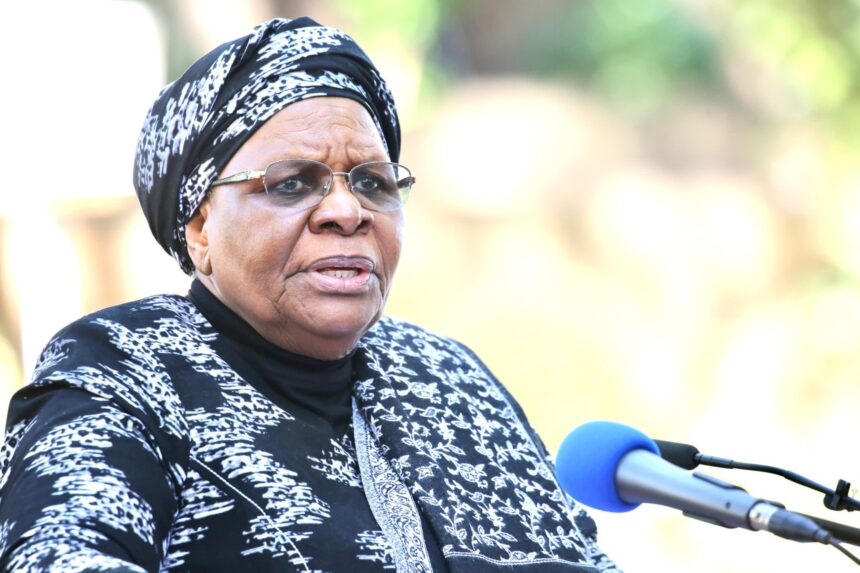Lahja Nashuuta
President Netumbo Nandi-Ndaitwah has urged Namibians – particularly members of the Ovaherero and Nama communities – to remain united and patient as efforts continue to bring finality to genocide negotiations with the German government.
Speaking at the first official Genocide Remembrance Day ceremony at Parliament Gardens in Windhoek on Tuesday, President Nandi-Ndaitwah emphasised the importance of national cohesion in confronting painful historical injustices. “I am calling on our people, in particular the Ovaherero and Nama communities, to understand the situation. We now have a day that unites us as a nation to remember the victims of the 1904–1908 genocide, a day for individuals and communities to come together and reflect on that dark chapter of our history” she stated.
Namibia set aside 28 May as Genocide Remembrance Day through Proclamation 19 of 2024, commemorating the closure of concentration camps established by the German colonial regime.
The date honours the memory of more than 100,000 Ovaherero and Nama people who were killed, displaced or subjected to horrific abuse under German colonial rule.
Nandi-Ndaitwah acknowledged ongoing frustrations over the slow progress and content of the genocide negotiations, which began formally in 2013. However, she stressed that significant strides have been made.
“We should find a degree of comfort in the fact that the German government has agreed that their troops committed genocide against the Ovaherero and Nama people.
They have offered an apology, and while we may not agree on the final quantum of reparations, that is part of the complex negotiations still underway”, she said.
She reiterated that Genocide Remembrance Day was not declared unilaterally, but followed nationwide consultations, debates in parliament and a recommendation by the National Assembly’s Standing Committee on the motion initially tabled by Hon. Usutuaije Maamberua in 2016. “The final decision was guided by the internationally-accepted principle of consensus. And while consensus doesn’t mean unanimity, it reflects broad national support”, Nandi-Ndaitwah continued.
The venue for the inaugural commemoration – Parliament Gardens – was also symbolic. It lies adjacent to a former concentration camp and is home to the Independence Memorial Museum, a structure representing the country’s journey from colonialism and apartheid to freedom and unity. Nandi-Ndaitwah then used the occasion to honour late Paramount Chief Kuaima Riruako, who tabled the first parliamentary motion on genocide in 2006, and the late Dr. Zedekia Ngavirue, Namibia’s first special envoy to Germany on genocide negotiations.
“The work of these national figures must not be in vain. Their contributions laid the foundation for the path we are on today,” she said. The ceremony comes just days after Africa Day, marked on 25 May, under the African Union theme “Justice for Africans and People of African Descent through Reparations,” further underscoring the continental significance of Namibia’s ongoing negotiations with Germany.
Sharing similar sentiments, Vice President Lucia Witbooi said the day was not only about remembrance, but also a path towards healing.
“This day serves not only as a moment of collective reflection, but as a vital opportunity to acknowledge historical injustices and promote healing, reconciliation and nation-building. By commemorating this painful chapter of Namibia’s history, the nation affirms its commitment to peace, stability and justice. Equally, it educates younger generations about the resilience of their ancestors and fosters national unity,” she observed. Meanwhile, chairperson of the Council of Traditional Leaders, Gaob Immanuel |Gaseb acknowledged the government’s ongoing efforts to conclude genocide negotiations with Germany. “This is the day we reflect on the atrocities committed against our ancestors. I never imagined that in my lifetime, there would be serious talks about the genocide, let alone a national day of this nature”, he said.
“I sincerely appreciate the government of the Republic of Namibia for its patience and commitment to seeing this matter through to its final conclusion.
My gratitude also goes to the government for upholding peace and tranquillity. I truly believe that the Namibian government is pursuing this genocide discourse with the goal of achieving peace and harmony. I do not believe that such atrocities will ever happen again in our country”,|Gaseb said.



